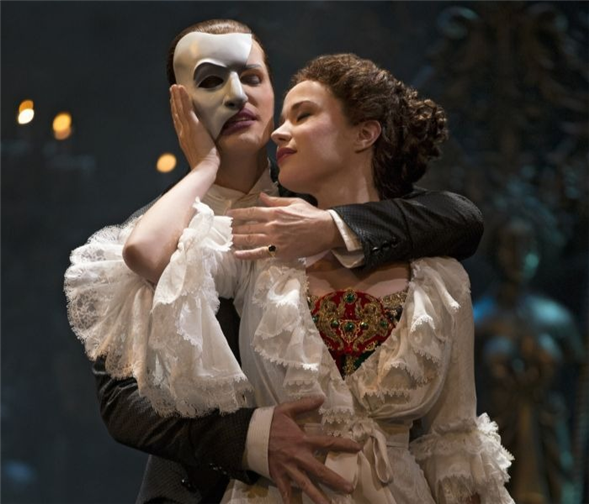Translate Page

How the #MeToo movement made me see my favorite musical from a new perspective
---
When someone says she has a complicated relationship in her life, she's usually referring to her mother or an ex. But for me, my most complicated relationship is with my favorite musical: The Phantom of the Opera.
I became a super-Phan the first time I saw the show on Broadway when I was a freshman in college. I spent hours researching information about various casts and productions, analyzing different interpretations of the title character and cycling through diverse performances on YouTube. Over the course of a year, I went back to the production 12 more times, and I would have continued to go if I had not started to struggle with my feelings surrounding the show.
For a long time, a large part of my identity was entwined with being a Phantom fan, and even though I knew Christine's relationship with the Phantom was dysfunctional (to seriously understate it), I still regarded it as romantic. But my perspective began to change as the #MeToo movement forced me to reevaluate the inherent power imbalance between controlling older men and naïve younger women. Eventually, I had an unpleasant experience along those lines in my own life, and Phantom turned into a trigger.
Like Christine, I was a newcomer to the world of the performing arts. I'd just moved to Manhattan to study theatre and journalism. Serendipitously, I developed what I believed to be a friendship with a much older man in the industry. He was mature and successful, and I wanted him to serve as a mentor, but he had other intentions. Like the Phantom, for months he gave me a false sense of security, leading me to believe he wanted to help my career. I developed an attachment that was hard to let go of once his true colors showed, and it put me in a place where I feared not complying with him, lest I lose the "friendship."
After finally cutting off contact, it took me a month or so to realize how severely he took advantage of me. I couldn't help but connect the dots of what I went through to what my favorite musical heroine endures. I began to feel immense guilt for still holding on to my love for the show and the Phantom character. Did that discredit the validity of my pain? It became hard to watch to certain parts of Phantom without seeing them from new angles. I used to adore "The Mirror," but suddenly I realized it proved the Phantom had groomed Christine for months. "Twisted Every Way" was no longer about Christine's vulnerability, it was evidence of her trauma. During "Final Lair," I ceased to wonder whether Christine ever had feelings for the Phantom; she was clearly a victim of his manipulation as he preyed upon the grief she had for her father. The entire plot of the show caused me to realize how I had, in my delusion, romanticized my own unhealthy relationship for months. So I stopped romanticizing my favorite musical, and that nearly killed my love for it.
But after months of grappling with my knotty feelings for Phantom, I've decided I can admire the complexity of the title character, ponder the questions his story provokes and even pity him without excusing his dark side. Acknowledging that the Phantom committed many wrongs doesn't mean I'm complacent about his toxicity. I see him clearly now, without smoke and mirrors. I no longer ignore the way he abused his power over Christine, who I now view as the true heart of the show, despite her name being left out of the title.
These days when I return to Phantom, my eyes stay on Christine the majority of the time. She may not be as mysterious or complicated as the Phantom, but much can be learned from watching her. We get to see her journey from the start and understand how the Phantom is able to entrap her, and how she finally escapes. I used to think Christine's strength was in her kindness, but now I know her strength is in her courage. She's a survivor and a beacon of hope for women like me, who also broke free.
---
TDF MEMBERS: At press time, discount tickets were available for The Phantom of the Opera. Go here to browse our current offers.
Meg Masseron is currently studying Digital Journalism and Theatre Arts with a concentration in Theatre History at Marymount Manhattan. Follow her on Twitter at @megmnyc. Follow TDF at @TDFNYC.
Top image: Hugh Panaro and Sierra Boggess in The Phantom of the Opera. Photo by Joan Marcus.